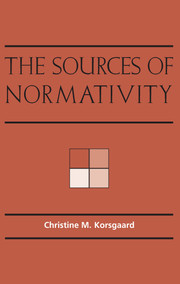Book contents
- Frontmatter
- Contents
- Notes on the contributors
- Acknowledgments
- Introduction
- Prologue: Excellence and obligation a very concise history of western metaphysics 387 bc to 1887 ad
- 1 The normative question
- 2 Reflective endorsement
- 3 The authority of reflection
- 4 The origin of value and the scope of obligation
- 5 Reason, humanity, and the moral law
- 6 Morality and identity
- 7 Universality and the reflective self
- 8 History, morality, and the test of reflection
- 9 Reply
- Bibliography
- Index
6 - Morality and identity
Published online by Cambridge University Press: 20 May 2010
- Frontmatter
- Contents
- Notes on the contributors
- Acknowledgments
- Introduction
- Prologue: Excellence and obligation a very concise history of western metaphysics 387 bc to 1887 ad
- 1 The normative question
- 2 Reflective endorsement
- 3 The authority of reflection
- 4 The origin of value and the scope of obligation
- 5 Reason, humanity, and the moral law
- 6 Morality and identity
- 7 Universality and the reflective self
- 8 History, morality, and the test of reflection
- 9 Reply
- Bibliography
- Index
Summary
In her third lecture Professor Korsgaard distinguishes between what she calls ‘the categorical imperative’ and ‘the moral law’ (3.2.4). The categorical imperative imposes a minimal condition on free choice: such choice must be guided by a principle we have given ourselves which has the form of a general rule or law (3.2.3). A free will must choose a maxim it can regard as a law. What Korsgaard calls ‘the moral law’, then, is a further specification of what this law which I give myself must be: it must be the kind of thing ‘all rational beings could agree to act on together in a workable cooperative system’ (3.2.4). As Professor Korsgaard quite rightly points out, Kant doesn't make this distinction and she suggests that awareness of the distinction will allow us to see a certain incompleteness in Kant's argument. He wants to show that any free will is bound by the moral law but he, in fact, establishes only the weaker claim that we are bound by the categorical imperative.
Korsgaard's argument, then, has two parts. First, she defends the bits of Kant where he got it right: normativity arises from the structure of the free will and the free will must stand under the categorical imperative. Second, she completes Kant's argument, showing that autonomous human agents stand not only under the categorical imperative but also under the moral law.
I'll start with the first part, the part that is supposed to parallel Kant's own discussion.
Information
- Type
- Chapter
- Information
- The Sources of Normativity , pp. 189 - 199Publisher: Cambridge University PressPrint publication year: 1996
Accessibility standard: Unknown
Why this information is here
This section outlines the accessibility features of this content - including support for screen readers, full keyboard navigation and high-contrast display options. This may not be relevant for you.Accessibility Information
- 13
- Cited by
